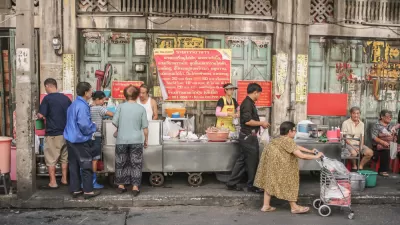The ongoing efforts to reform street vending laws in Los Angeles gained national media attention recently. Can local officials find a way to overcome controversy and complexity to legalize street vending this year?
"Sidewalk vending is illegal in the City of Los Angeles, but that doesn’t stop an estimated 50,000 Angelenos from setting up shop in the streets," according to an article for Salon by Henry Grabar. "Their highly visible presence on downtown sidewalks, around parks and stadiums, and at bus stops, metro stations, and parking lots is a bold display of civil disobedience."
The idea that street vending is illegal in Los Angeles, where street vending is one of the most ubiquitous forms of public life, is counterintuitive, to say the least. Two city councilmembers have decided its time to connect the law with the reality of life on the street.
According to Grabar, "Los Angeles is the only one of the nation’s 10 largest cities where street vending is illegal, but that could change this year: Two city councilmen, José Huizar and Curren Price, have been working since November of 2013 to move the nation’s second-largest city toward legalizing street vendors. In May, the city’s chief legislative analyst issued a report recommending that L.A. adopt a comprehensive vending policy. The legislation is currently receiving input from relevant city departments, but a spokesman for Huizar told me they expect it to come back before the council later this year — and to pass."
Grabar goes on to detail both the evolving culture of Los Angeles—amidst a shift toward pedestrianism and more public forms of interaction—and the evolving assumptions of urbanism theory, which has begun to find more benefits and lessons in informal arrangements.
FULL STORY: Los Angeles renaissance: Why the rise of street vending reveals a city transformed

Study: Maui’s Plan to Convert Vacation Rentals to Long-Term Housing Could Cause Nearly $1 Billion Economic Loss
The plan would reduce visitor accommodation by 25,% resulting in 1,900 jobs lost.

North Texas Transit Leaders Tout Benefits of TOD for Growing Region
At a summit focused on transit-oriented development, policymakers discussed how North Texas’ expanded light rail system can serve as a tool for economic growth.

Why Should We Subsidize Public Transportation?
Many public transit agencies face financial stress due to rising costs, declining fare revenue, and declining subsidies. Transit advocates must provide a strong business case for increasing public transit funding.

How Community Science Connects People, Parks, and Biodiversity
Community science engages people of all backgrounds in documenting local biodiversity, strengthening connections to nature, and contributing to global efforts like the City Nature Challenge to build a more inclusive and resilient future.

Alabama: Trump Terminates Settlements for Black Communities Harmed By Raw Sewage
Trump deemed the landmark civil rights agreement “illegal DEI and environmental justice policy.”

Dear Tesla Driver: “It’s not You, It’s Him.”
Amidst a booming bumper sticker industry, one writer offers solace to those asking, “Does this car make me look fascist?”
Urban Design for Planners 1: Software Tools
This six-course series explores essential urban design concepts using open source software and equips planners with the tools they need to participate fully in the urban design process.
Planning for Universal Design
Learn the tools for implementing Universal Design in planning regulations.
City of Santa Clarita
Ascent Environmental
Institute for Housing and Urban Development Studies (IHS)
City of Grandview
Harvard GSD Executive Education
Toledo-Lucas County Plan Commissions
Salt Lake City
NYU Wagner Graduate School of Public Service



























